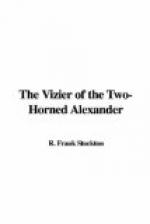“He listened to me with respectful attention, and when I had finished he assured me that he knew even more about Mme. de Sade than I did. He was perfectly aware that she was a religious and highly estimable lady, and he did not desire to do anything which would give her a moment’s sorrow. ‘Then stop following her,’ said I, ’and give up that habit of staring at her in such a way as to make her the object of attention to everybody around her.’ ‘That is asking too much,’ answered Master Petrarca. ’That lady has made an impression upon my soul which cannot be removed. My will would have no power to efface her image from my constant thought. If she does not wish me to do so, I shall never speak a word to her; but I must look upon her. Even when I sleep her face is present in my dreams. She has aroused within me the spirit of poetry; my soul will sing in praise of her loveliness, and I cannot prevent it. Let me read to you some lines,’ he said, picking up a piece of manuscript which was lying on the table. ’It is in Italian, but I will translate it for you.’ ‘No,’ said I; ’read it as it is written; I understand Italian.’ Then he read the opening lines of a sonnet which was written to Laura in the shadow. He read about six lines and then stopped.
“‘It is not finished,’ he said, ’and what I have written does not altogether satisfy me; but you can judge from what you have heard how it is that I think of that lady, and how impossible it is that I can in any way banish her from my mind, or willingly from my vision.’
“‘How did you come to know that her name is Laura?’ I asked. ’I found it out from the records of her marriage,’ he answered.
“I talked for some time to this young man, but failed to impress him with the conviction that his conduct was improper and unworthy of him. I found means to inform Mme. de Sade of the result of my conversation with Petrarch,—as we call his name in English,—and she appeared to be satisfied that the young student would soon cease his attentions, although I myself saw no reason for such belief.
“I visited the love-lorn young man several times, for I had become interested in him, and endeavored to make him see how foolish it was—even if he looked upon it in no other light—to direct his ardent affections upon a lady who would never care anything about him, and who, even if unmarried, was not the sort of woman who was adapted to satisfy the lofty affection which his words and his verses showed him to possess.
“‘There are so many beautiful women,’ said I, ’any one of whom you might love, of whom you might sing, and to whom you could indite your verses. She would return your love; she would appreciate your poetry; you would marry her and be happy all your life.’
“He shook his head. ‘No, no, no,’ he said. ’You don’t understand my nature.




